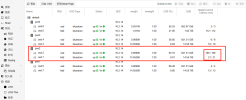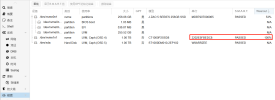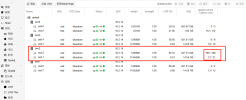What is the impact of PVE hard disk wearout 100%?
- Thread starter runing
- Start date
-
- Tags
- ssd wearout wearout disk ssd
You are using an out of date browser. It may not display this or other websites correctly.
You should upgrade or use an alternative browser.
You should upgrade or use an alternative browser.
Wearout is what manufacterer set it to be. So usually just a warning that your drive can die any minute, not that it will.
This reading is what is being read by S.M.A.R.T. data from the NVMe itself - it is not a PVE metric & as pointed out - its manufacture dependent.
Most S.M.A.R.T data is usually only useful when looking at it in a relative fashion. So in your case - only you know what you have been doing with the drive & its history. When did this "number" reach 100? How long did it take to get there? At what rate etc. ? This may (or may not) give you an idea of what's actually going on with the drive & how critical is a replacement. In my book - if in doubt replace it.
Most S.M.A.R.T data is usually only useful when looking at it in a relative fashion. So in your case - only you know what you have been doing with the drive & its history. When did this "number" reach 100? How long did it take to get there? At what rate etc. ? This may (or may not) give you an idea of what's actually going on with the drive & how critical is a replacement. In my book - if in doubt replace it.
Will wearing out 100% affect the latency of ceph-osd?This reading is what is being read by S.M.A.R.T. data from the NVMe itself - it is not a PVE metric & as pointed out - its manufacture dependent.
Most S.M.A.R.T data is usually only useful when looking at it in a relative fashion. So in your case - only you know what you have been doing with the drive & its history. When did this "number" reach 100? How long did it take to get there? At what rate etc. ? This may (or may not) give you an idea of what's actually going on with the drive & how critical is a replacement. In my book - if in doubt replace it.
Recently, the latency of ceph-osd has been found to be high and low, sometimes even slower than hdd


It's also possible that the drive is new and the manufacturer count backwards from 100%to 0.Will wearing out 100% affect the latency of ceph-osd?
It's a QLC drive, so it will wear quickly and be slow(er than HDD's) often because it cannot handle prolonged sustained writes.Recently, the latency of ceph-osd has been found to be high and low, sometimes even slower than hdd
Kingston or crucial are really a drive for gaming and office, not for enterprise.
Last edited:
Your Kingston SNVS/1000G based on docs has a 3 year warranty at 240 TBW, that works out to about 0.22 DWPD. I hope you're not using that in an enterprise situation.




